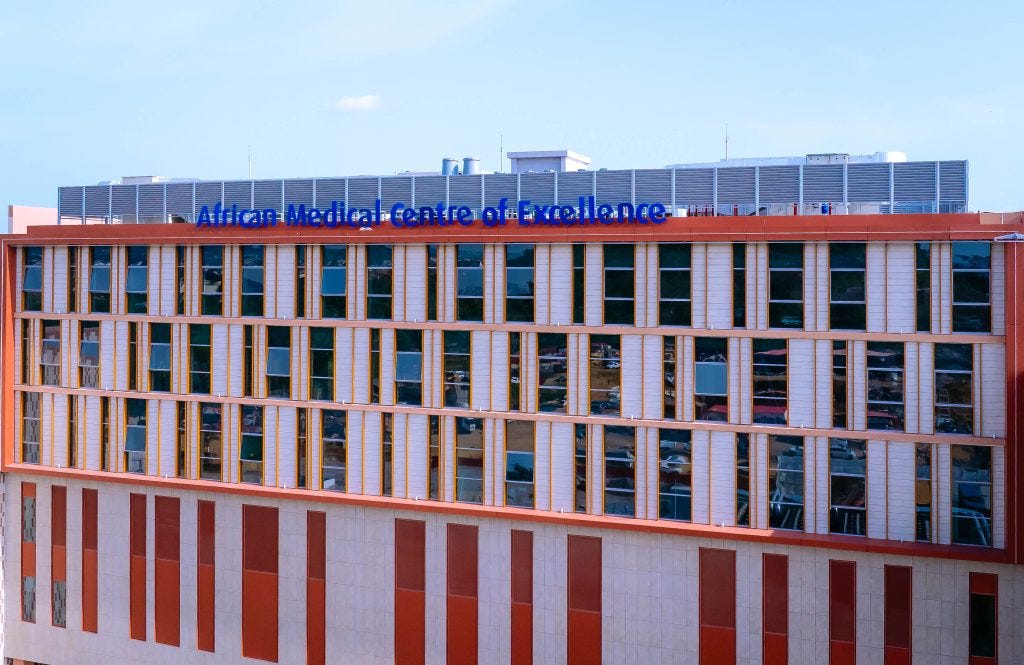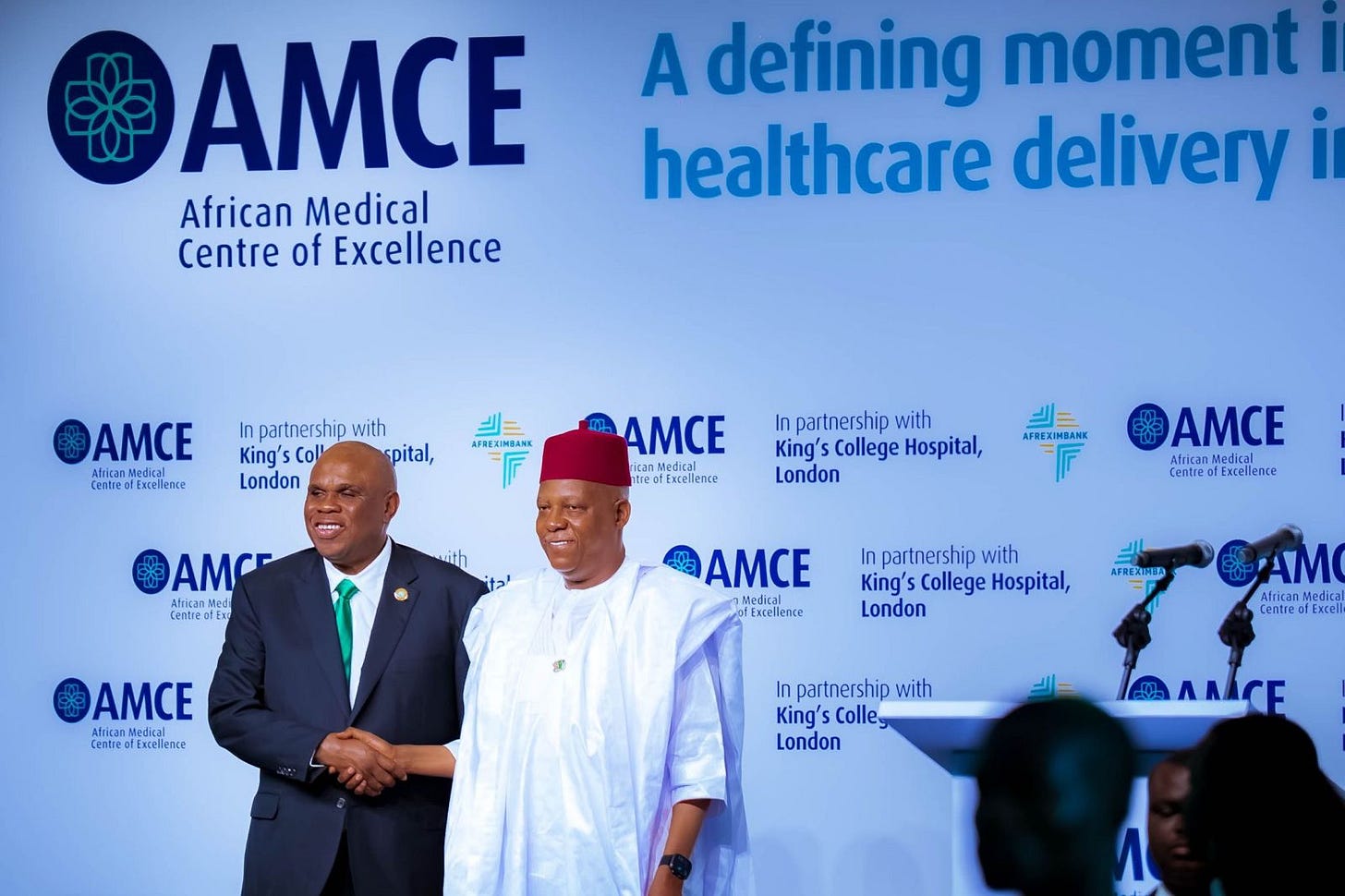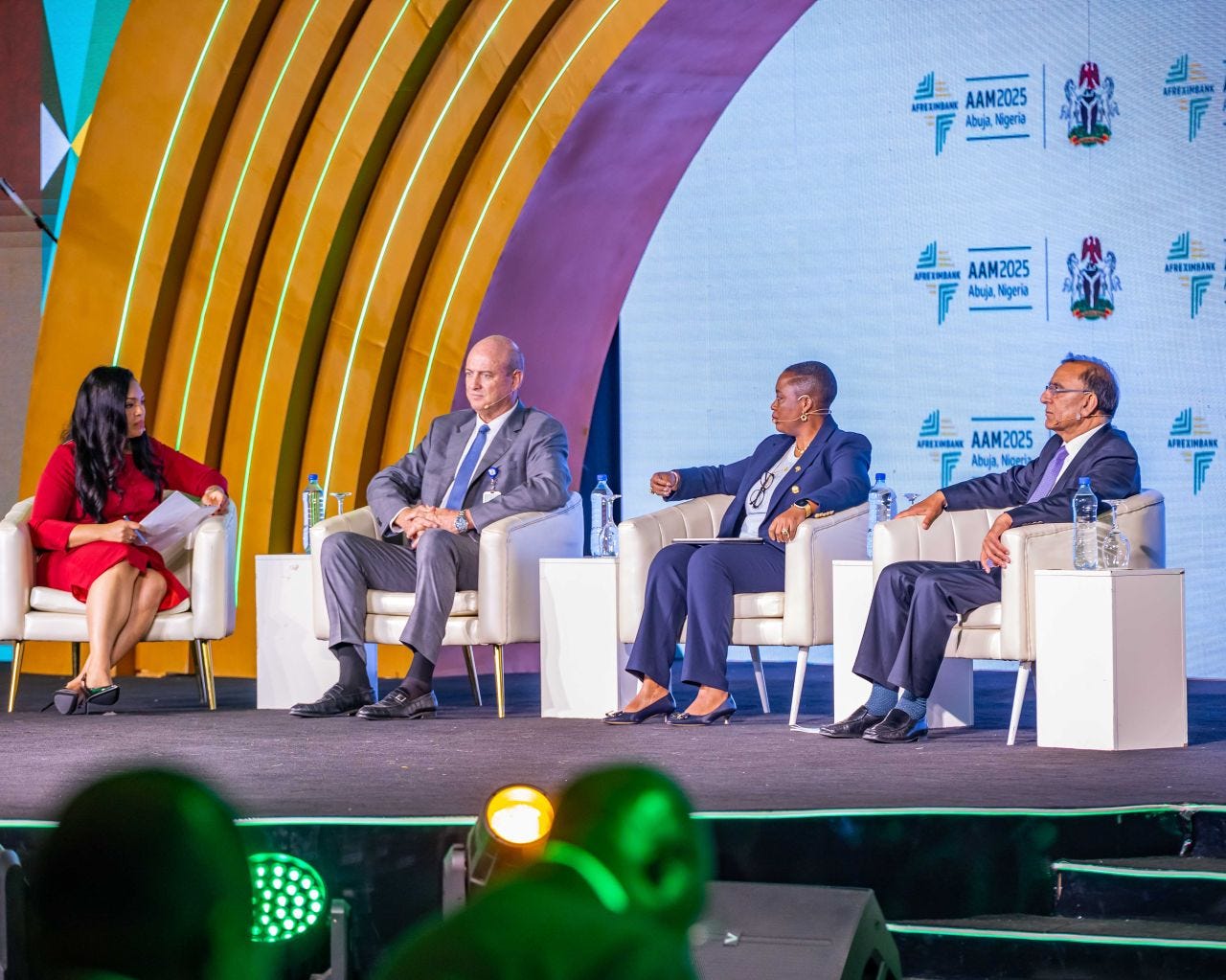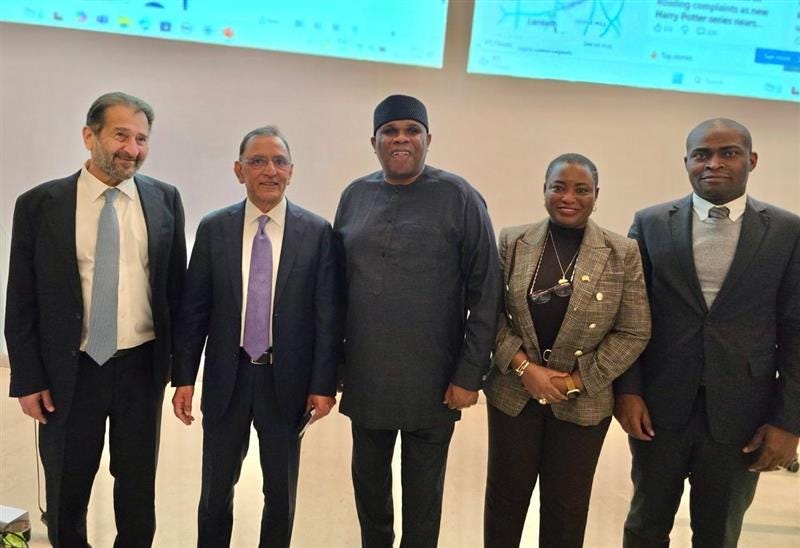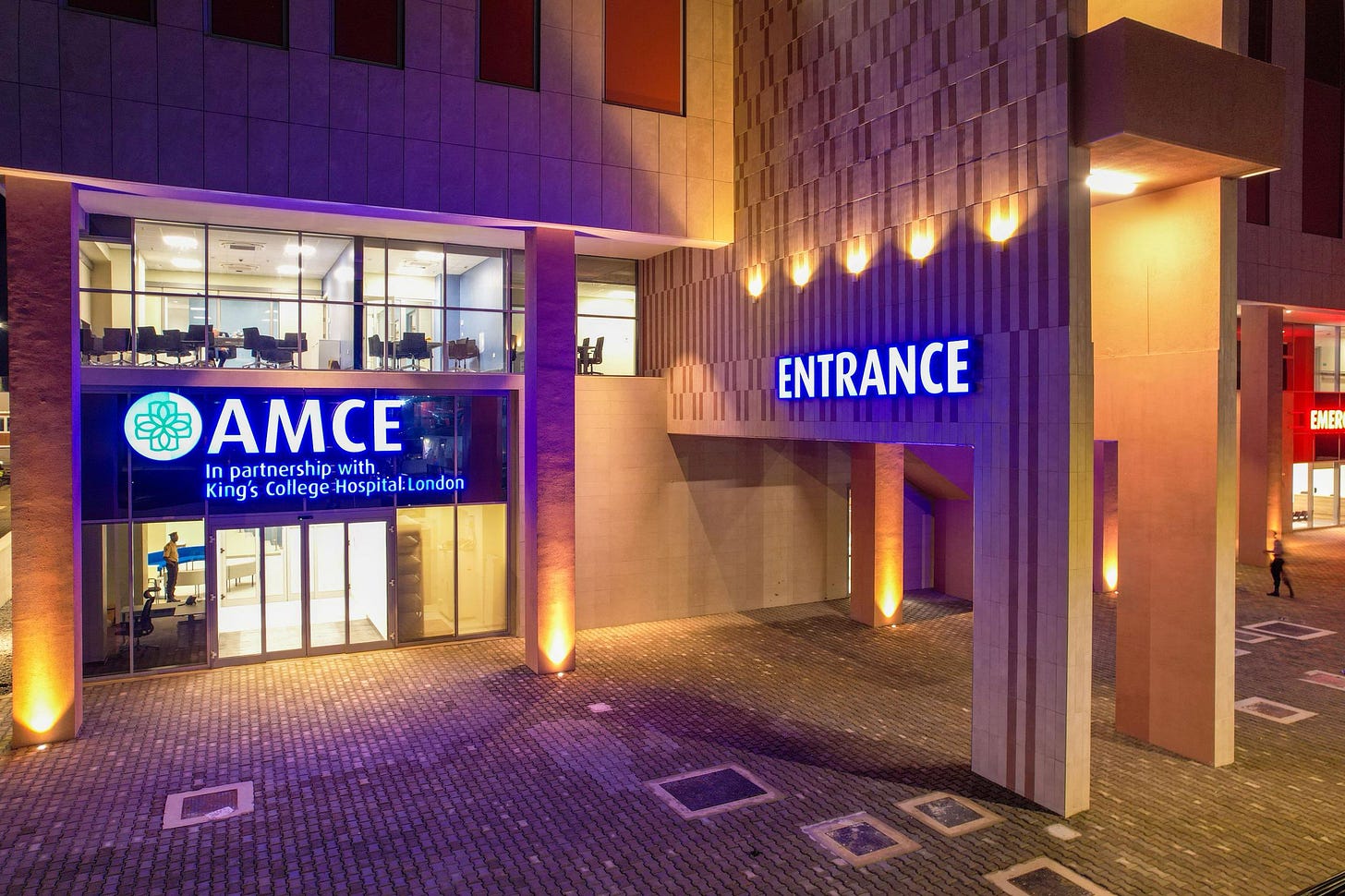Reclaiming Africa’s Destiny: The New African Medical Center of Excellence (AMCE) in Abuja, Nigeria
How Africa is rewriting a new chapter for global healthcare
The African Medical Center of Excellence (AMCE) in Abuja is a project I’ve followed since the commencement of construction was announced in 2021.
My collected AMCE tweets, over a period of 4 years:
June 2021 | February 2022 | May 2022 | June 2022 | December 2022 | November 2023 | January 2024 | February 2024 | February 2024 | March 2024 | March 2024 | July 2024 | January 2025 | January 2025 | February 2025 | May 2025 | May 2025 | June 2025 | June 2025 | June 2025
Four years later, the first phase has been completed—and commissioned on June 5, 2025, by Vice President Kashim Shettima GCON, representing President Bola Ahmed Tinubu.
The power of partnerships
Conceived and financed by Afreximbank—to the tune of over $300 million so far, out of a planned total of about $700 million—and supported by technical/clinical partnerships with Kings College Hospital, London, and the Christie NHS Foundation Trust, Manchester, England; and financing partnerships with NNPC Limited and Nigeria’s Bank of Industry (BOI) Limited.
The Christie NHS Foundation Trust: Partner in clinical expertise
Bank of Industry Limited: Critical investment partner
NNPC Limited: Strategic equity partner
King's College Hospital NHS Foundation Trust: Partner for medical education, clinical research, and staff development
World-class infrastructure, technology and people
The AMCE is designed to address existing gaps in the areas of cardiovascular medicine, oncology, and haematology, while also offering general medicine support and world-class diagnostics.
One of the panels at the 32nd Afreximbank Annual Meetings in Abuja, Nigeria (25-28 June, 2025) focused on the AMCE, bringing together the Chief Executive Officer of the AMCE, Brian Deaver; Ms. Oluranti Doherty, Managing Director for Export Development at Afreximbank, and Prof. Ghulam Mufti OBE, world-renowned haematologist/haemato-oncologist, and Professor of Haemato-Oncology at Kings College Hospital. Moderated by BBC journalist, Lisa-Marie Misztak.
The headline: “Conversation on Reclaiming Africa’s Destiny Through Investment and Innovation in Health Care.”
The completed first phase, commissioned on June 5, 2025, comprises 170 beds, featuring the latest medical technology, including an 18 Mev cyclotron and a 3 Tesla MRI Scanner.
There’s also a 20-bed Intensive Care Unit (ICU) that Doherty says “has no comparison anywhere on the continent.”
Also: the largest stem cell laboratory in West Africa, five theatres, three catheterisation laboratories, six critical care unit beds, 20 chemotherapy chairs, and more.
It aims to serve more than 350,000 patients by 2030, and create 3,000 jobs.
“At Afreximbank we recognize that there is a connection between healthcare, economic transformation, and trade. For economic growth to be sustainable, we need a healthy population,” Doherty said. “Health security is fundamental to Africa’s economy. Africa will not reach its full potential without resilient, inclusive and innovative health systems.”
According to her, Nigeria and Africa spend an estimated $1.1 billion and $7 billion respectively on annual outbound medical tourism. These are apart from the cost of brain drain.
On brain drain, Deaver said, “I’ve learnt that brain drain is less about paychecks and more about [professional] development and working with new types of technology.” He added that the AMCE has recruited “top [medical] specialists.”
Origin Story: Near death—and a bond of destiny
Mufti (second left, above), a world-renowned haematologist of more than 40 years, told the story of how the AMCE vision came to be.
Turns out the President and CEO of Afreximbank, Prof. Benedict Oramah (middle, above), had a serious health issue around 2014, and had to be taken to King’s College Hospital, London, UK for treatment.
The doctor in charge: Prof. Mufti.
Oramah made a full recovery.
“No sooner had he made the recovery than he made an appointment to see me,” Mufti said. “He [Oramah] said, My life has been saved, I want to save the lives of others who cannot afford it. That was the beginning of the idea of the AMCE.”
In Oramah’s words at an event to celebrate Mufti in November 2024, “Through a series of near-death experiences and recoveries, Professor Mufti and I built a lasting bond that transcended the conventional doctor-patient relationship. It was this bond of destiny that gave birth to a transformational healthcare initiative aimed at saving millions of lives in Africa.”
That’s how the AMCE came to be. Mufti said the facility is “comparable to anything you’ll see in the West.”
Financing the advancement of health equity for Africa
She added that Covid-19 and the stark and disturbing healthcare inequities it exposed inspired/compelled Afreximbank to rollout the following:
A $2 billion Fund to purchase 400 million doses of J&J vaccines for 42 African countries and 6 CARICOM countries (here)
A $2 billion Facility to support health and pharmaceutical manufacturing in Africa, targeting a 40% domestic manufacturing capacity for the continent by 2040 (here)
A $200m Financing Commitment to support the African Medical Supplies Platform (AMSP)—a joint initiative of the African Union’s African Centre for Disease Control (CDC), the Economic Commission for Africa (ECA), Afreximbank and businessman Strive Masiyiwa, an AU Special Envoy (here)
In honour of Professor Mufti, Afreximbank has launched:
A Scholarship Fund to support eligible African students pursuing medical training at King’s College London and the proposed AMCE Medical and Nursing School in Abuja.
A $300,000 Research Grant to support haematology research projects proposed by Prof. Mufti
What does the future hold?
The second phase of the Abuja AMCE will take it to 500 beds, while also adding:
Medical and nursing schools
Clinical trials facility
Hotel for patients’ families
Employee housing
The goal is also to have a network of AMCEs across Africa, with linkages between them, Prof Mufti disclosed.
According to Doherty, the next AMCE “is already on the drawing board” — and the next two will be in East and Central Africa respectively.
The African Life Sciences Foundation (ALSF)
The AMCE stands on three pillars: Research, Innovation and Treatment.
To sustainably finance and advance the research and innovation, and support the AMCE vision, Doherty said that the Board of Afreximbank has approved the creation of the Africa Life Sciences Foundation, “to facilitate access to quality healthcare for vulnerable and underprivileged medical populations, and also to support research in neglected diseases that no one else wants to invest in.”
The ALSF is taking off with $75 million in seed funding from Afreximbank.
Donate here
Some more of my thoughts on how Nigeria’s healthcare infrastructure is changing in positive ways—with prospects for the slowing and eventual reversal of medical tourism—here



